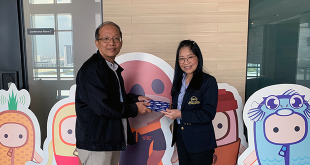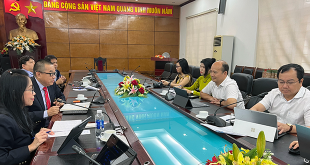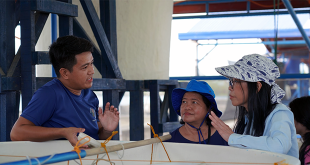The Mission from SEAFDEC, led by the Secretary-General, Dr. Suttinee Limthammahisorn, along with the Deputy Secretary-General and Japanese Trust Fund Manager, Dr. Tomoko Nakazato, and senior officials from the SEAFDEC Secretariat and Training Department, paid courtesy calls on various agencies and institutions in Japan from 11 to18 December 2023. The visit was aimed at strengthening the collaboration between SEAFDEC and the Government of Japan as well as relevant fisheries and aquaculture agencies and institutions including the Fisheries Agency of Japan (FAJ), Japan Fisheries Research and Education Agency (FRA) and its field stations in Yokohama and Nagasaki, Tokyo University of Marine Sciences and Technology (TUMSAT), Hakodate Research Center for Fisheries and Oceans, Hokkaido University, Nagasaki Prefectural Institute of Fisheries, and Nagasaki University.
The SEAFDEC Mission visited the Yokohama Station of the FRA and met with the President, Dr. Ichiro Nakayama, and staff. The SEAFDEC Secretary-General expressed her appreciation to the FRA for the support rendered to SEAFDEC, particularly in extending the Deputy Chiefs to AQD, MFRDMD, and IFRDMD as well as experts who supported the technical activities of SEAFDEC throughout the past years. She also informed the FRA of the emerging challenges that confront the sustainable development of fisheries in the region and requested the FRA to continue supporting the capacity building of the staff of SEAFDEC and the ASEAN Member States.
The SEAFDEC Mission visited the Director-General of the FAJ, Mr. Takeshi Mori, and the Councilor and Director-General for International Fisheries and SEAFDEC Council Director for Japan, Dr. Takumi Fukuda, and other officials of the FAJ. Dr. Suttinee expressed appreciation to the FAJ for the continued support to SEAFDEC through the Japanese Trust Fund (JTF) and for extending the researchers from the FRA to support the activities of TD, AQD, MFRDMD, and IFRDMD. The support strengthened the capacity of SEAFDEC and its Member Countries in various aspects such as eliminating IUU fishing, improving fisheries management, developing cost-effective aquaculture, and providing platforms for the ASEAN Member States where the results of the discussions could be raised at fisheries-related international fora such as CITES, WTO, UNCLOS, among others. She also expressed her gratitude to the FAJ for considering continuing the support to SEAFDEC through the JTF-7 which will be implemented in 2025–2029.
Furthermore, the SEAFDEC Mission attended the SEAFDEC Technical Support Committee (TSC) Meeting facilitated by the Marino Forum 21 (MF21). The Committee, which is composed of representatives from fisheries-related universities and institutions in Japan, reported the activities that support SEAFDEC and the Member Countries, particularly in building capacity and extending resource persons and expertise. While expressing appreciation to the MF21 and TSC for the support extended in 2023, Dr. Suttinee reiterated the need for continued support, particularly in human capacity development for the young staff of SEAFDEC and the Member Countries as well as technical assistance in a wide range of fisheries subjects under the JTF-7.
The SEAFDEC Mission also paid courtesy visits to TUMSAT, Hokkaido University, and Nagasaki University including their facilities and laboratories . During the visit, SEAFDEC and representatives from universities exchanged information on fisheries and aquaculture in Southeast Asia and SEAFDEC conveyed its role in supporting the ASEAN Member States toward sustainable development of fisheries and aquaculture. In this regard, Dr. Suttinee underscored the importance of continued cooperation between SEAFDEC and these universities in human capacity development in various forms such as on-the-job training or higher education of SEAFDEC staff in Japan, internships of Japanese students in SEAFDEC, and sharing knowledge of the Japanese experts from universities at SEAFDEC events. The priority concerns of the region were also discussed, such as stock assessment, fish larvae identification, oceanography, hydroacoustic survey, marine debris, microplastics, among others.
 SEAFDEC Southeast Asian Fisheries Development Center
SEAFDEC Southeast Asian Fisheries Development Center















